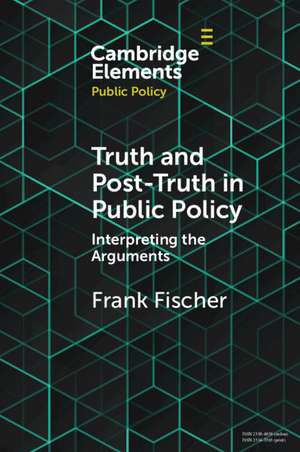Truth and Post-Truth in Public Policy: Elements in Public Policy
Autor Frank Fischeren Limba Engleză Paperback – 8 dec 2021
Din seria Elements in Public Policy
-
 Preț: 129.64 lei
Preț: 129.64 lei -
 Preț: 129.55 lei
Preț: 129.55 lei -
 Preț: 129.21 lei
Preț: 129.21 lei -
 Preț: 142.61 lei
Preț: 142.61 lei -
 Preț: 143.16 lei
Preț: 143.16 lei -
 Preț: 143.16 lei
Preț: 143.16 lei -
 Preț: 143.16 lei
Preț: 143.16 lei -
 Preț: 142.61 lei
Preț: 142.61 lei -
 Preț: 143.76 lei
Preț: 143.76 lei -
 Preț: 143.97 lei
Preț: 143.97 lei -
 Preț: 142.61 lei
Preț: 142.61 lei -
 Preț: 142.39 lei
Preț: 142.39 lei -
 Preț: 144.14 lei
Preț: 144.14 lei -
 Preț: 142.39 lei
Preț: 142.39 lei -
 Preț: 144.14 lei
Preț: 144.14 lei -
 Preț: 143.76 lei
Preț: 143.76 lei -
 Preț: 144.14 lei
Preț: 144.14 lei -
 Preț: 143.76 lei
Preț: 143.76 lei -
 Preț: 143.38 lei
Preț: 143.38 lei -
 Preț: 142.61 lei
Preț: 142.61 lei -
 Preț: 129.58 lei
Preț: 129.58 lei -
 Preț: 408.90 lei
Preț: 408.90 lei
Preț: 143.97 lei
Nou
Puncte Express: 216
Preț estimativ în valută:
27.55€ • 28.77$ • 22.75£
27.55€ • 28.77$ • 22.75£
Carte tipărită la comandă
Livrare economică 15-29 aprilie
Preluare comenzi: 021 569.72.76
Specificații
ISBN-13: 9781108796071
ISBN-10: 1108796079
Pagini: 75
Dimensiuni: 151 x 229 x 7 mm
Greutate: 0.14 kg
Ediția:Nouă
Editura: Cambridge University Press
Colecția Cambridge University Press
Seria Elements in Public Policy
Locul publicării:Cambridge, United Kingdom
ISBN-10: 1108796079
Pagini: 75
Dimensiuni: 151 x 229 x 7 mm
Greutate: 0.14 kg
Ediția:Nouă
Editura: Cambridge University Press
Colecția Cambridge University Press
Seria Elements in Public Policy
Locul publicării:Cambridge, United Kingdom
Cuprins
Preface; 1. Introduction: Policy science, facts and the post-truth challenge; 2. Post-truth defined; 3. Post-truth: Ignorance and “anything goes”; 4. The political rise of the post-truth culture; 5. Emotion and post-truth: living with falsehoods; 6. Social media and disinformation; 7. Beyond the critique: rescuing interpretive social science; 8. The interpretive policy-analytic approach: social meanings and alternative realities; 9. Social Meaning in Interpretive Policy Analysis; 10. Interpretive social science and the scientific community: The “hard” sciences; 11. Citizens confront the experts: Context and emotion in ordinary reason; 12. Political and policy knowledge as ordinary practical knowledge; 13. Climate policy and denialism: A political illustration; 14. Climate Policy and politics: the social translation of evidence into political knowledge; 15. Climate research: Uncertain knowledge and falsification; 16. COVID-19 denialism: Interpreting narrative arguments; 17. Narrative arguments and the policy-analytic challenge: Interpreting COVID-19 statistics in social context; 18. Rejecting COVID-19 lockdown: Interpreting political-economic and ideological arguments; 19. Deliberating with post-truth deniers: Concluding remarks; References.
Recenzii
'With 'Truth and Post-Truth in Public Policy - interpreting the arguments', Frank Fischer offers us a powerful framework of critical analysis to unravel the complex thread that has brought us to the current and extreme situation of strong social confrontation … It is a book that not only feeds the debate, but our hopes.' Rosana Boullosa, Critical Policy Studies
'Fischer guides readers through a systematic and artfully argued application of the interpretive policy framework, offering not only a nuanced discussion about post-truth but also a tour of the workings of the framework (e.g., the concepts of social cognition, plausibility structures, truth regimes, and narrative arguments). As such, this is both a contribution to scholarship and a useful text for those seeking to learn more about the framework itself. Readers will benefit from Fischer's multi-disciplinary and critical theoretical perspective, sharpened over a career of provocative research about public participation and expert knowledge in policymaking. Above all, the book is a highly enjoyable and fluid read that not only provides an appraisal of where policy research currently sits in understanding post-truth but also establishes a roadmap for that research in the coming decades.' Kris Hartley, International Review of Public Policy
'Fischer guides readers through a systematic and artfully argued application of the interpretive policy framework, offering not only a nuanced discussion about post-truth but also a tour of the workings of the framework (e.g., the concepts of social cognition, plausibility structures, truth regimes, and narrative arguments). As such, this is both a contribution to scholarship and a useful text for those seeking to learn more about the framework itself. Readers will benefit from Fischer's multi-disciplinary and critical theoretical perspective, sharpened over a career of provocative research about public participation and expert knowledge in policymaking. Above all, the book is a highly enjoyable and fluid read that not only provides an appraisal of where policy research currently sits in understanding post-truth but also establishes a roadmap for that research in the coming decades.' Kris Hartley, International Review of Public Policy
Descriere
This Element analyses the phenomenon of post-truth and how it poses a problem for the public policy-oriented sciences.
